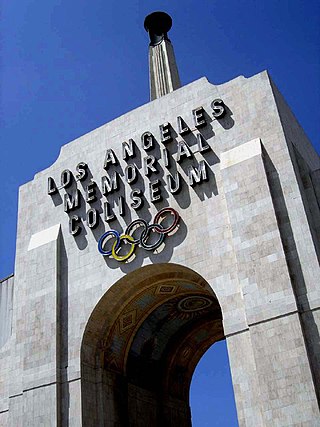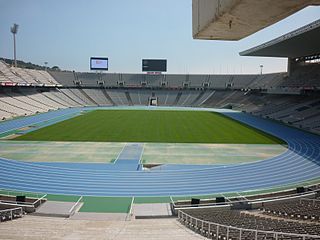
The Grand Sports Arena of the Luzhniki Olympic Complex, commonly known as Luzhniki Stadium, is the national stadium of Russia, located in its capital city, Moscow. Its total seating capacity of 78,011 makes it the largest football stadium in Russia and the ninth-largest stadium in Europe. The stadium is a part of the Luzhniki Olympic Complex, and is located in Khamovniki District of the Central Administrative Okrug of Moscow city. The name Luzhniki derives from the flood meadows in the bend of Moskva River where the stadium was built, translating roughly as "The Meadows". The stadium is located at Luzhniki Street, 24, Moscow.

Luzhniki Palace of Sports, formerly the Palace of Sports of the Central Lenin Stadium, is a sports arena in Moscow, Russia, a part of the Luzhniki Olympic Complex. Built in 1956, it originally had a spectator capacity of 13,700. In the past it was the host site of the world and European championships in ice hockey, gymnastics, volleyball, basketball, boxing, skateboarding and other sports.

For the 2000 Summer Olympics, a total of thirty sports venues were used. After Melbourne hosted the 1956 Summer Olympics, Australia made several bids for the Summer Olympics before finally winning the 2000 Summer Olympics by two votes over Beijing, China. Venue construction was set at the Homebush Bay area of Sydney in an effort to rehabilitate the land. Environmental studies of the area in the early 1990s forced remediation to be used for about a fifth of the site selected. Fifteen new venues were constructed for the Games. Many of the venues used for the 2000 Games continue to be in use as of 2020, although some of the pre-existing facilities have been demolished and replaced.

The Druzhba Multipurpose Arena is an indoor arena in Moscow, Russia, part of the Luzhniki Sports Complex. It was built in 1979, and the first competition held there was the finals of the 7th USSR Summer Spartakiad. It hosted volleyball preliminaries of the 1980 Summer Olympics and was a venue of the 1986 Goodwill Games. The capacity of the arena is for 3,500 people and is the regular home venue of WVC Dynamo Moscow Volleyball team.

The Olympic Pool, formerly Swimming Pool of the Central Lenin Stadium is an aquatics center that is part of the Luzhniki Sports Complex in Moscow, Russia. It was opened in 1957 and renovated in 1980. The 10,500-seat venue hosted water polo events at the 1980 Summer Olympics. It also hosted events of the 1973 Summer Universiade, 12th World Festival of Youth and Students, 1986 Goodwill Games, Spartakiads of the Peoples of the USSR and others.
The Luzhniki Small Sports Arena is an 8,700-seat indoor arena that is part of the Luzhniki Sports Complex in Moscow, Russia. The Arena was built in 1956 in the Soviet Union. It hosted volleyball competitions during the 1980 Summer Olympics.
Frank Fischer is an East German sprint canoer who competed from 1981 to 1986. He won nine medals at the ICF Canoe Sprint World Championships with four golds, three silvers, and two bronzes.
Sarina Hülsenbeck is an East German swimmer who competed in the late 1970s and early 1980s. She won a gold medal at the 1980 Summer Olympics in Moscow in the women's 4 × 100 m freestyle and competed in the 4 × 100 m medley relay qualifying round, but not in the final.
Vladislovas Česiūnas was a Lithuanian sprint canoeist who competed in the early 1970s, representing the Soviet Union. He won one Olympic medal and six ICF Canoe Sprint World Championships medals during his career. He later became known for his role in "The Česiūnas Affair" when he defected from the 1979 ICF Canoe Sprint World Championships in Duisburg, West Germany only to return to the Soviet Union afterward for his "misconduct".
For the 1960 Summer Olympics, a total of thirty-four sports venues were used. The Basilica of Maxentius, the Baths of Caracalla, the Appian Way, and Via Cassia were among the ancient Roman venues used for the games. The football stadium in Florence hosted the 1934 FIFA World Cup and would later host the 1990 FIFA World Cup. Stadio Olimpico would later serve host to the 1987 IAAF World Championships in Athletics and the final venue for the 1990 FIFA World Cup. The marathon would be lit at night by Italian soldiers holding torches that included the Appian Way with a finish at the Arch of Constantine.
For the 1964 Summer Olympics, a total of thirty-three sports venues were used. Six of the venues were built before the International Olympic Committee awarded the 1964 Games to Tokyo in 1959. This included two venues that hosted the 1958 Asian Games. There were thirteen new, eight temporary, and five reconstructed and/or renovated venues that were used during the event. During the Olympics, wind and weather had issues with two athletic events. After the Olympics, one venue hosted both a FIFA World Cup and a World Athletics Championship event while another also hosted a World Athletics Championship event.

For the 1968 Summer Olympics, a total of twenty-five sports venues were used. Most of the venues were constructed after Mexico City was awarded the 1968 Games. Mexican efforts in determining wind measurement led to sixteen world records in athletics at the University Olympic Stadium. All four of the football venues used for these games would also be used for both of the occurrences that Mexico hosted the FIFA World Cup, in 1970 and 1986.

For the 1972 Summer Olympics, a total of thirty-two sports venues were used. A majority of the venues used were new construction in time for the 1972 Games after Munich was awarded the Games in 1966. Kiel Bay was the only venue from the 1936 Summer Olympics to be used for the 1972 Games. A stretch of the Autobahn near Munich was used for cycling's road team time trial event. After the Olympics, Olympiastadion hosted the final of the FIFA World Cup less than two years later. Augsburg's Eiskanal has served as host to three Canoe Slalom World Championships while the shooting range hosted the World Shooting Championships 2010. Olympiapark was part of Munich's bid for the 2018 Winter Olympics.

For the 1976 Summer Olympics, a total of twenty-seven sports venues were used. Several venues used had been in existence before Montreal made its first Olympic bid in the late 1930s. By the 1950s, Montreal's bid for the Olympics shifted from Winter to Summer before it was finally awarded the 1976 Summer Games in 1970. Strikes in 1974 and 1975 affected construction of the Montreal Olympic Park, most notably the stadium, pool, and velodrome, to the point where the FINA President threatened to not have the diving, swimming, and water polo events take place there for the games in early 1976 though all three venues were completed as best as possible prior to the 1976 Games. 27 swimming world records were set as a result. The oldest stadium, Molson Stadium at McGill University, would be converted into artificial turf for the field hockey tournaments while the sailing program in Kingston, Ontario, would be held in freshwater, both for the first time in Summer Olympic history. Indoor track cycling took place at the Olympics for the first time at the velodrome. Once the Olympics finished, the Montreal Expos and Montreal Alouettes moved into Olympic Stadium, staying until 2004 and 1997, respectively. The Montreal Canadiens remained at the Montreal Forum until they moved to the Molson Centre in March 1996. In 1992, the velodrome was converted into an indoor zoo now known as the Montreal Biodôme. Île-Notre Dame hosted a canoe sprint world championships and two rowing world championships since the 1976 Games, but the area north of the basin on the island has been host to the Formula One Canadian Grand Prix on an almost annual basis since 1978.

For the 1984 Summer Olympics, a total of thirty-one venues were used. The Los Angeles Memorial Coliseum and the Rose Bowl, two venues previously used for the 1932 Summer Olympics, were used for the 1984 Games. Between the 1932 and the 1984 Summer Olympics, the expansion of professional sports teams assisted in the growth of the facilities that would be used for the 1984 events. Only two new permanent venues were constructed, both using corporate sponsorship, though neither were mentioned in the official Olympic report. Many other venues had temporary adjustments and returned to their normal usage once the 1984 Olympics were completed. Stanford Stadium in Palo Alto and the Rose Bowl later served as venues for the Super Bowl, the FIFA World Cup, and the FIFA Women's World Cup.
For the 1988 Summer Olympics, a total of thirty-one sports venues were used. South Korea hosted its first World Championships in 1978 in shooting sports. Three years later, Seoul was awarded the 1988 Summer Olympics. Many of the venues constructed for the 1988 Games were completed two years earlier in time for the Asian Games. The 1986 Asian Games served as test events for the 1988 Summer Olympics. The men's marathon course was lined by 36,000 policemen. Steffi Graf won a gold medal in women's singles to complete the "Golden Slam". None of the football venues used for these games were used for the 2002 FIFA World Cup that Korea co-hosted with Japan.

For the 1992 Summer Olympics in Barcelona, a total of forty-three sports venues were used.
A total of twenty-nine sports venues were used for the 1996 Summer Olympics.

For the 2004 Summer Olympics, a total of thirty-five sports venues were used. Athens hosted the first modern Olympic Games in 1896, which used venues such as Panathinaiko Stadium and the city of Marathon for which the long-distance race would be named. From the end of the 1896 Games until the late 1970s, Greece underwent numerous political changes that included the Balkan Wars, two World Wars, a civil war, and a military coup that resulted in a junta that lasted from 1967 to 1974. A change in democracy in 1975 resulted in Greece's admission into the European Economic Community in 1979.











